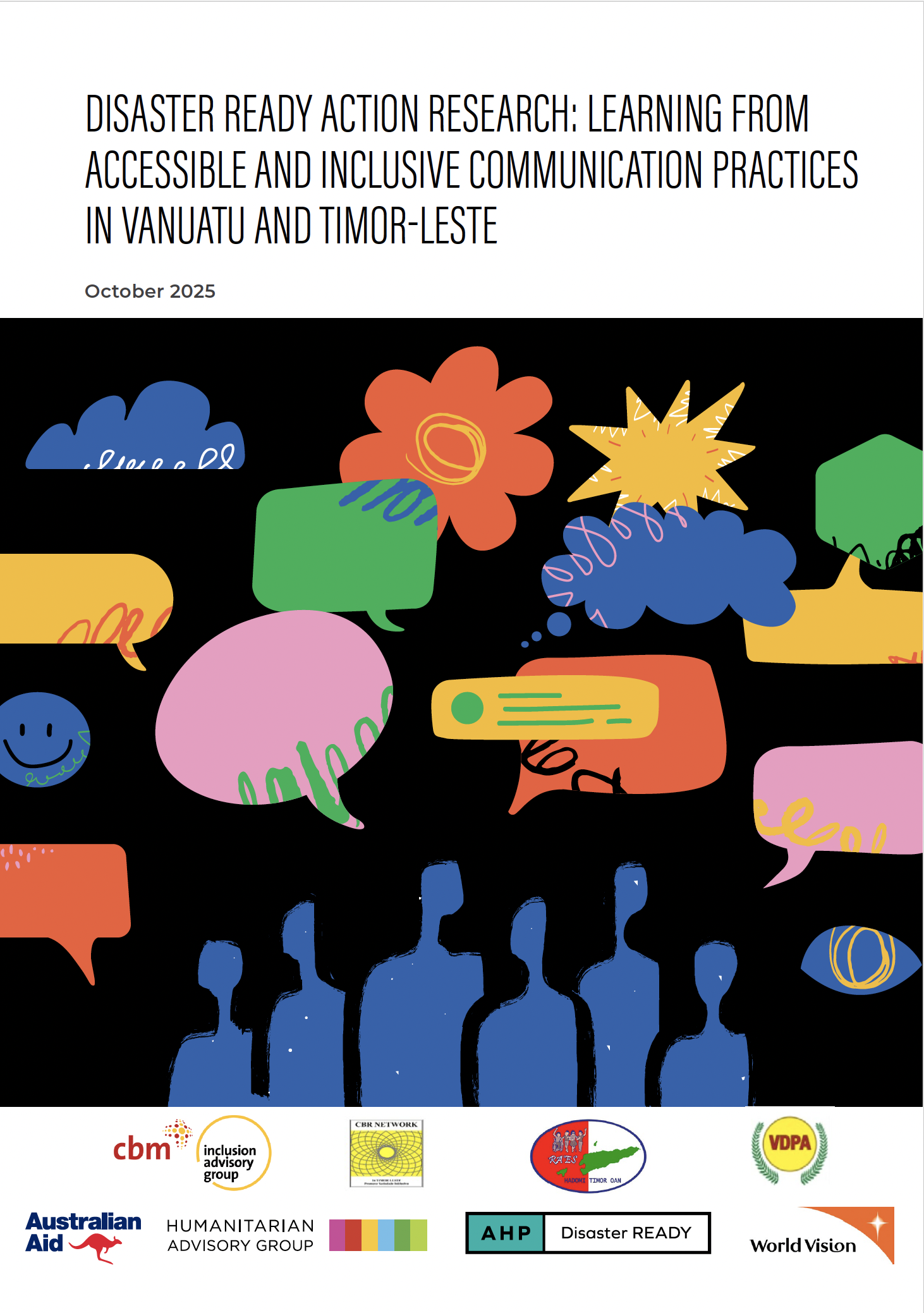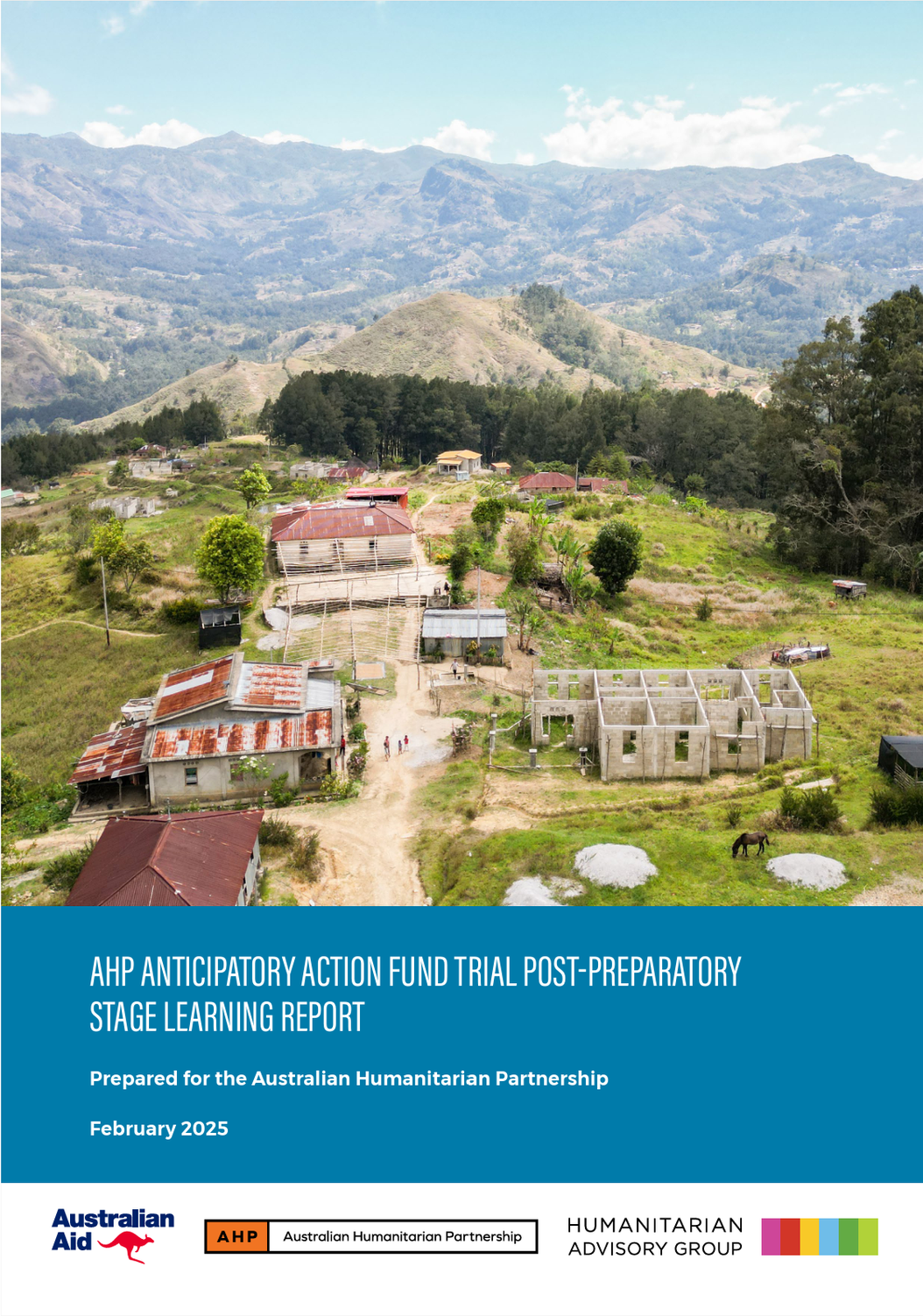Disaster READY action research: Learning from accessible and inclusive communication practices in Vanuatu and Timor-Leste
This study is to support DRCC members and partners to strengthen their practices of communication to communities for greater inclusion of persons with disabilities in disaster preparedness and climate resilience efforts. It builds on global best practice and contextual realities to identify opportunities for scaling up effective communication in context.
AHP Anticipatory Action Fund Trial Post-Preparatory Stage Learning Report
This report document the systems and processes implemented for the preparatory stage of the AHP Anticipatory Action Fund to identify what is working well and where opportunities exist for improvement and learning. The report focuses on cross-country lessons from Timor-Leste, Vanuatu, PNG and Solomon Islands.
Learning Brief: Semi-Annual Reflection Timor-Leste November 2024
November 2024: The AHP partners in Timor-Leste met to reflect on the key achievements, learnings, and challenges, while also receiving feedback and looking at future opportunities for Disaster READY across the country.
Learning Brief: Annual Reflection Timor-Leste May 2024
May 2024: The AHP partners in Timor-Leste met to reflect on the key achievements, learnings, and challenges, while also receiving feedback and looking at future opportunities for Disaster READY across the country.
Learning Brief: Semi-Annual Reflection Timor-Leste December 2023
December 2023: The AHP partners in Timor-Leste met to reflect on the key achievements, learnings, and challenges, while also receiving feedback and looking at future opportunities for Disaster READY across the country.
Learning Brief: Annual Reflection Timor-Leste June 2023
June 2023: The AHP partners in Timor-Leste met to reflect on the key achievements, learnings, and challenges, while also receiving feedback and looking at future opportunities for Disaster READY across the country.
Learning Brief: Semi-Annual Reflection Timor-Leste December 2022
December 2022: The AHP partners in Timor-Leste met to reflect on the key achievements, learnings, and challenges, while also receiving feedback and looking at future opportunities for Disaster READY across the country.
Disability Inclusion in Climate-Smart Agriculture
A new tip sheet produced by Organisations of People with Disabilities participating in the AHP Disaster READY program and CBM Australia shares practical advice for creating inclusive climate smart agriculture programming and activities.
Evaluation of AHP Activations on Food Security and Livelihoods in Ethiopia and Kenya
An independent evaluation assessed the relevance, coherence, effectiveness, efficiency, impact and sustainability of AHP food security and livelihoods activations in the Horn of Africa, as well as the complementarity of WASH and protection components. The evaluation also considered accountability, localisation and the extent to which the interventions improved resilience of the target populations and addressed the needs of marginalised groups.
AHP Learning Brief: Lessons from the evaluation of the COVID-19 Pacific and Timor-Leste Preparedness and Recovery NGO Partnership
The Humanitarian Advisory Group undertook a longitudinal evaluation of the COVID-19 Pacific and Timor-Leste Preparedness and Recovery NGO Partnership to understand the impact of the partnership and support learning for improving implementation. This AHP learning brief captures key lessons for AHP partners.
COVID-19 Pacific and Timor-Leste Preparedness and Recovery NGO Partnership: Final Evaluation Report
The COVID-19 Pacific and Timor-Leste Preparedness and Recovery NGO Partnership was set up by the Australian Government in June 2020 to support communities across multiple countries to become resilient to and recover from the impacts of COVID-19, and included support to the Australian Humanitarian Partnership. An independent evaluation found that partnerships achieved significant benefits for affected communities.
Thematic review of Accountability to Affected Populations in AHP activations and Disaster READY
This thematic review of Accountability to Affected Populations (AAP) was designed to inform learning and promote and enhance practice across the AHP mechanism in the area of AAP, including identifying challenges, risks, mitigations and recommendations to improve practice.
Evaluation of the Australian Humanitarian Partnership Bangladesh Humanitarian Response - Phase III
The evaluation of the AHP Bangladesh Response Phase III assessed results against four outcomes focused on: the basic needs of Rohingya and host communities; self-reliance of the affected population; resilience of Rohingya and host communities; and reform of the humanitarian system.
AHP Learning Brief: Lessons Learned from the Real-time Review of the AHP Ukraine Response
This learning brief captures the lessons from the Real Time Review (RTR) of the AHP response in Ukraine, with a particular focus on mental health and psychosocial support in emergencies.
AHP III Bangladesh: a disability inclusion journey in the Rohingya crisis
This report documents achievements and lessons learned on disability inclusion in the AHP Phase III response in Bangladesh, and presents recommendations to further progress disability inclusion in the Rohingya response.
AHP Learning Brief: Risk Communication and Community Engagement in the AHP COVID-19 Response in Papua New Guinea
This AHP learning brief summarises the findings of the evaluation of risk communication and community education during the AHP COVID-19 response. This short document summarises key findings and lessons for practitioners.
Risk Communication and Community Engagement in the AHP COVID-19 Response in Papua New Guinea: Evaluation and Learning Report
In 2021–22, five AHP consortiums received additional funding to support the rollout and uptake of the COVID-19 vaccine in Papua New Guinea and to reduce the spread of the virus, through a focus on risk communication and community engagement (RCCE). This report details the achievements, enablers, challenges and learning in relation to RCCE approaches in AHP programming.
Colours of hope: partnering for rights and dignity
‘Colours of hope: partnering for rights and dignity’ is a photographic journey into the lives of displaced Rohingya living in Bangladesh and the communities that host them. The photo book captures the work of the Australian Humanitarian Partnership Consortium in Bangladesh across a wide range of sectors and activities, with images taken in early 2023.
AHP Phase III Bangladesh Impact Report: an honest account
This report seeks to reflect the lived experience of people with disabilities in the Rohingya AHP Phase III Response, their stories and feedback on what has changed for them, and the continued barriers they face.
AHP Indonesia COVID-19 Response: Pulih Bersama End-of-Program Learning Event
This report presents the key lessons learned and challenges faced during the AHP Indonesia COVID-19 Response. During the End-of-Program Learning Event consortium members discussed the innovative localisation strategies which contributed to the program’s success.





















